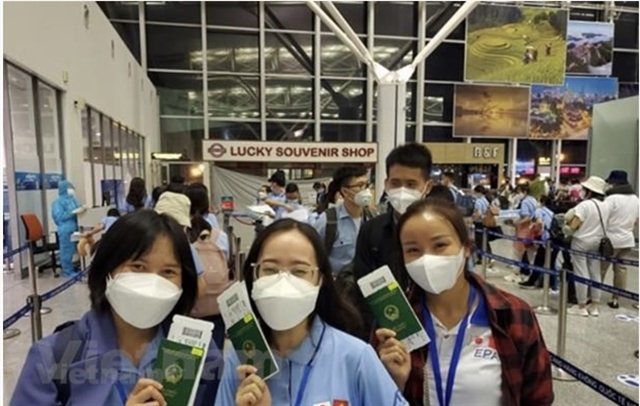 Society
Society


|
| Vietnamese off to work abroad. The Ministry of Labour, Invalids and Social Affairs currently is piloting sending workers abroad under contracts in some developed countries. — VNA/VNS Photo |
HÀ NỘI — The Ministry of Labour, Invalids and Social Affairs (MOLISA) demanded strict handling of firms sending Vietnamese labourers to work in Greece without the approval of the authorities.
According to an announcement by MOLISA’s Department of Overseas Labour, no companies have yet been approved to register labour supply contracts to work in Greece.
Therefore, employees must be wary of recruitment information and can contact the department if they need support with market information or want to report scammers.
Firms that have been approved to prepare labour sources and register for labour supply contracts will be listed on the department website dolab.gov.vn, allowing workers to register with the right enterprises and recruitment agencies and avoid illegal intermediaries and brokers.
Greece is a new market for Việt Nam, so MOLISA has asked the department to strengthen the management of Vietnamese going overseas to work in the country as Việt Nam and Greece have not signed an agreement to ensure publicity and transparency.
In addition, MOLISA will strictly handle enterprises that organise the preparation of labour sources or send workers to Greece without the approval of the State management agency.
The ministry and department will further coordinate with relevant agencies in investigating and handling organisations and individuals as intermediaries and brokers to illegally send Vietnamese workers overseas, or who take advantage of labour export activities to scam Vietnamese workers.
Previously, during the official working visits to Việt Nam and Greece by the two countries' senior leaders, discussions were held about cooperation in bringing Vietnamese workers to the European nation to work.
The Greek side highly appreciated the qualifications, vocational skills and discipline of Vietnamese workers and agreed that the two sides would soon negotiate and sign a labour cooperation agreement.
In order to realise the ambitions of the two countries’ leaders, agencies are promoting exchanges and negotiations to sign an agreement on labour cooperation.
Greece is currently short of staff in many fields.
The country currently only receives guest workers from non-EU countries to work in the industries of agriculture, livestock, fishing, construction, garments, hospitality and domestic help.
In addition, some Asian countries that have supplied labourers to Greece are Bangladesh, the Philippines, and China.
The income of unskilled guest workers in Greece is about 700 to 800 euros per month (VNĐ18-20 million after deducting taxes).
The workers coming to Greece to work under Visa D type (Long-term visa from three months up to 12 months) can be extended on the spot for no more than five years.
In addition to maintaining the traditional labour export markets, MOLISA is aiming to expand to higher-quality markets, of which Europe is a hot option, that require higher skills to gradually improve the quality of the labour force.
Currently, the ministry is piloting sending workers abroad under contracts in some developed countries such as Australia, New Zealand, Germany, the Czech Republic, Slovakia and Canada which are all markets with high income and the best working environment for workers. — VNS




